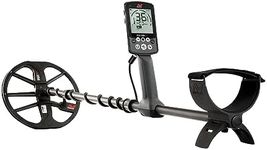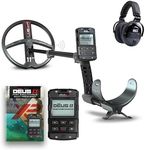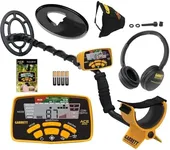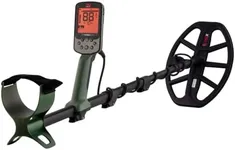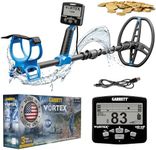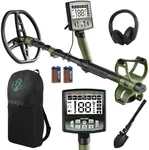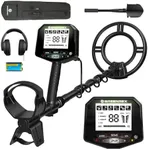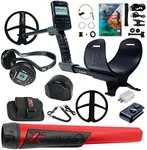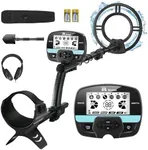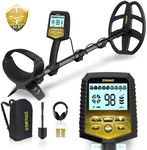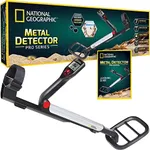Buying Guide for the Best Metal Detectors
Choosing a metal detector is about matching your needs and interests with the features that each device offers. People use metal detectors for several purposes, such as searching for coins, jewelry, relics, or gold, at different locations such as parks, beaches, or even in the mountains. The right choice depends on where you plan to search, what you hope to find, and your experience level. Think about how you’ll use the detector most often, and which features can make your searches more effective and enjoyable.FrequencyFrequency in metal detectors refers to how many times per second a detector sends an electromagnetic signal into the ground. Low frequencies (like 3-8 kHz) are generally better for finding larger, more conductive metals such as silver or copper coins, and tend to penetrate deeper into the ground. High frequencies (like 15-70 kHz or more) are more sensitive to smaller items and lower-conductivity metals like gold, but may not go as deep. If you’re mainly looking for coins or general items, a low or mid-frequency detector works best. If you’re after small gold nuggets or tiny jewelry, a high-frequency detector is better. Consider what you want to find most often and match your frequency to those targets.
DiscriminationDiscrimination is the detector’s ability to tell the difference between different types of metals, helping you ignore unwanted items like iron nails or bottle caps. Basic metal detectors might only allow simple discrimination between ferrous (iron) and non-ferrous metals, while more advanced models let you fine-tune which metals you want to detect or ignore. For general treasure hunting like coins or jewelry, higher discrimination helps you avoid digging up junk. If you're interested in relic hunting where iron objects might be valuable, you’ll want a more adjustable setting. Always consider the typical trash in your search area and your target metals to decide how much discrimination control you need.
Ground BalanceGround balance is how the detector adjusts for the natural minerals in the ground, which can interfere with detecting actual metal objects. Some detectors have fixed ground balance, suitable for typical soils that aren't heavily mineralized. Others offer manual ground balance for experienced users who want more control, or automatic ground balance that adjusts on its own to changing soil conditions. If the places you plan to search have highly mineralized soil, such as near beaches or goldfields, opting for a detector with good ground balance options will drastically improve your results. For beginners or casual users in typical parks or fields, a basic or automatic system works just fine.
SensitivitySensitivity controls how strongly the detector reacts to metal objects. Higher sensitivity helps you detect smaller or deeper items, but it can also make the detector more responsive to ground minerals or electrical interference, which may cause false signals. Lower sensitivity can make the machine more stable in tough soils, but you might miss weaker signals. The right sensitivity setting depends partly on the type of ground you’ll be working in and the size of the items you want to find. If stability is more important, lower sensitivity is better; if finding the smallest targets matters most, higher sensitivity is worth trying, with patience for some extra false alerts.
Coil Type and SizeThe search coil is the part of the metal detector that you swing over the ground. Larger coils can cover more ground and detect objects deeper, but are less sensitive to small items and can be heavy to handle for long periods. Smaller coils are better for pinpointing targets, working in trashy areas, and finding small objects, but won’t reach as deep. There are also different coil designs, such as concentric or double-D (DD) coils, with DD coils generally handling mineralized soils better. Choose the coil size and style based on your main location (wide open fields versus trashy parks) and what you want to find (deep large relics versus small surface items).
Water ResistanceWater resistance refers to whether the metal detector can handle moisture, rain, or even submersion. Some detectors have waterproof coils but non-waterproof control boxes (the electronics part), while others are fully waterproof. If you plan to search along beaches, in shallow water, or in wet conditions, having at least a waterproof coil is important to protect your equipment. For serious underwater treasure hunting, look for a completely submersible model. If you’ll only hunt on dry land, regular water resistance is normally enough.
Weight and ErgonomicsWeight and ergonomics mean how comfortable the metal detector feels to carry and use for long periods. Lightweight detectors are easier to handle, especially for kids or anyone who plans to search for hours at a time. Features like adjustable shafts, padded grips, and balanced designs reduce fatigue and make the hunt more enjoyable. Before buying, consider who will be using the detector most and how much time they’ll spend searching. Trying different models or reading user experiences about comfort is a smart move.

